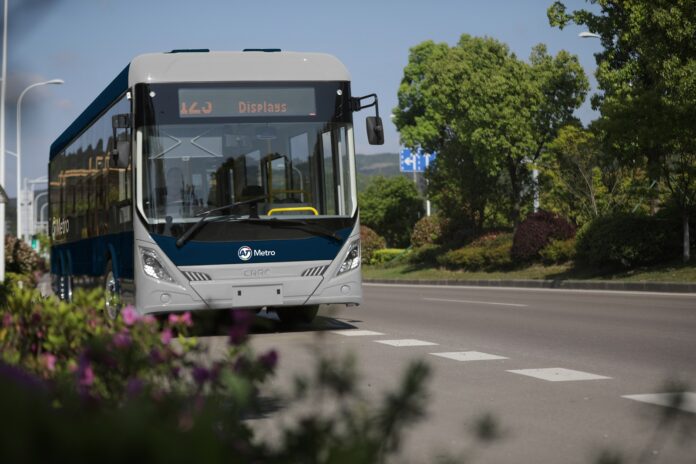Source: Auckland Council
Australasia’s biggest electric bus order has been announced, in a partnership between Auckland Transport and NZ Bus.
This will see a further 152 battery electric buses (BEVs) on Auckland’s roads and will reduce greenhouse gas emissions from the AT Metro bus fleet by an estimated 11 per cent per year– which is almost 10,000 tonnes of carbon dioxide annually, relative to 2019 emissions.
These BEVs will replace around 12 per cent of the diesel bus fleet in Tāmaki Makaurau, in alignment with AT’s Low Emission Bus Roadmap 2020 (LEBR).
The additional BEVs will significantly boost the number of zero emission buses operating on AT bus services across Auckland with NZ Bus providing services in the city centre and across some of the city’s most congested urban areas.
Mayor Phil Goff says the new electric buses will help Auckland progress its climate change goals by reducing carbon emissions from transport.
“These 152 new e-buses will replace around 12 per cent of Auckland’s diesel bus fleet and reduce Auckland Transport’s greenhouse gas emissions by an estimated 11 per cent annually – equivalent to almost 10,000 tonnes of carbon dioxide a year,” he says.
“With transport making up more than 40 per cent of Auckland’s emissions profile, it’s crucial that we pull every available lever to reduce emissions.
“Having already halted the purchase of new diesel vehicles and rolled out 33 electric buses on more than 13 services throughout the region, this is another step towards a zero-emissions bus fleet for Tāmaki Makaurau. It’s encouraging to see Auckland Transport and NZ Bus working together to make that happen.”
The BEVs will be deployed across four years, with plans for the first group to be driving the Tāmaki Link from October next year, followed by other services operated from the central and east Auckland bus depots.
AT’s Chief Executive, Shane Ellison, says it is critical that carbon emissions are reduced across the globe.
“As an organisation, Auckland Transport is dedicated to doing our bit by actively supporting the goals of Te Tāruke-ā-Tāwhiri: Auckland’s Climate Plan.
“We are well on our way in transitioning to an emissions-free public transport fleet by 2040, which will have a myriad of benefits for Tāmaki Makaurau – including improved air quality within the city centre and healthier communities.
“Within the last 18 months, we’ve introduced 33 new electric services in the city, Waiheke Island, as well as the new AirportLink service connecting with electric trains at Puhinui Station for a carbon-free trip to Auckland Airport. The announcement of 152 additional electric buses is extremely positive for our city.”
AT and NZ Bus and have been working on plans to accelerate the BEV introduction since late 2020 following a proposal from NZ Bus to replace a significant part of its current diesel fleet with electric buses.
NZ Bus Executive Director of Strategic Projects, Peter McKenzie says:
“Auckland Transport and Auckland Council have been very supportive of the proposal and keen to work with us to increase the number of electric vehicles operating on AT’s bus services.
“The new decarbonisation team at Auckland Transport has been great to work with and really keen to improve Auckland’s emission profile as soon as possible. With support from AT and Waka Kotahi NZTA, we will significantly accelerate the electric vehicle rollout over the next four years and create a platform for further decarbonisation strategies to follow from there.”
AT’s current zero-emission bus fleet is being showcased in a virtual exhibition at the United Nations Climate Change Conference (COP 26) in Glasgow this month.
To view AT’s case study in the virtual room at COP 26, please click here.



